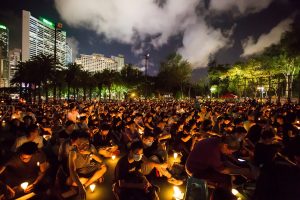Three remarkable Hong Kongers – Chow Han-tung, Albert Ho, and Lee Cheuk-yan – are about to go on trial in Hong Kong for being Chinese patriots.
The Chinese state regularly brands pro-democracy activists as being “anti-China,” but how can the Chinese Communist Party (CCP) claim that opponents are disloyal to the nation when people accused of subversion have a long history of Chinese patriotism?
In Hong Kong, now very much under the CCP’s thumb, the consequences of the anti-China smear have resulted in these three defendants being charged with subversion and facing up to a lifetime in jail. Their trial is scheduled to begin on November 11. They have all previously faced a host of other charges which emanate from their role as organizers of the Hong Kong Alliance in Support of Patriotic Democratic Movements of China.
Since the 1989 massacre of democracy protesters in Beijing’s Tiananmen Square, the Alliance has held mass vigils to commemorate the event. Their memorials were attended by hundreds of thousands of Hong Kongers, featuring both patriotic and pro-democracy songs, readings and testimony, including from the mothers of protesters killed or jailed in 1989.
Following the imposition of the draconian National Security Law in 2020 the vigil was banned, thus curtailing the only public event on Chinese soil where the massacre was commemorated.
Younger Hong Kong democracy activists had been critical of the vigil prior to the upsurge of the 2019 protest movement. They believed that the Hong Kong democracy movement needed to focus on Hong Kong and were suspicious of the Alliance for its insistence on promoting Chinese patriotism.
Once the clampdown on liberty in Hong Kong bulldozed its way through civil society organizations and effectively disallowed all forms of dissidence, the criticism came to an abrupt halt. It became clear that the fate of democracy in Hong Kong was umbilically tied to events on the Chinese mainland.
Chow Han-tung, 40, a barrister, is the youngest of the defendants. She was drawn into political activism by the suffering and neglect of the victims of the 2008 Szechuan earthquake. Although she has spent most of her jail time in solitary confinement, she remains defiant. This year she made a personal vigil for the 1989 victims by going on hunger strike in her cell.
Albert Ho, 73, was a founder of Hong Kong’s Democracy Party and represented the party in the legislature. A solicitor, whose law firm is famous for its work on human rights and political cases, Ho is battling lung cancer in jail, with reports of far from adequate medical treatment.
Lee Cheuk-yan, 68, was dispatched to provide material aid to the Tiananmen Square protests before the 1989 massacre. He is a veteran trade union leader and founder of Hong Kong’s Labor Party, which he represented in the legislature for many years.
They are among the 1,942 political prisoners in Hong Kong, a remarkably high number in a territory with just over 7 million residents.
The prosecution of the Hong Kong Alliance leaders is of particular interest because they challenge the CCP’s central narrative of patriotism versus anti-China subversion.
The uncomfortable fact, which the party deliberately overlooks, is that while people like Chow, Ho and Lee were actively defending the interests of their compatriots on the Chinese mainland, many of the most avid supporters of the new regime in Hong Kong were busy serving and supporting the previous colonial regime.
In its rewriting of history the CCP absurdly goes so far as to deny that Hong Kong was ever a colony, but colonial retreads proliferate in the ranks of the new order where they insist that they have always been loyal to the motherland.
Meanwhile the price of defying the regime has steadily risen. A recent report published by the Committee for Freedom in Hong Kong on prison conditions provides harrowing reading. Some of the worst abuses are the result of overriding protections for prisoners, which remain in place but are simply ignored with official sanction.
Most people in Hong Kong are, of course, not activists and are keeping their heads down. The very long prison sentences being handed out for political offenses provides a stern reminder of the consequences for stepping out of line.
To deter dissent, a Stasi-style informer network is in operation. Schools and universities are heavily monitored to root out any hint of dissidence and Hong Kong’s once vibrant media has withered to a mere shadow of its former self.
The history of Hong Kong’s descent into authoritarian rule is not that dissimilar from the fate of other places where liberty has been expunged. But there is one major difference: Hong Kongers enjoyed a long period of freedom, even after China assumed power over the former colony in 1997. Not only were events like the Tiananmen Square vigil tolerated, but they remained as an important part of the Hong Kong calendar – meaning that for over two decades of CCP rule, there was still a tiny space in Chinese territory where one of the most violent clampdowns on protest in the PRC’s history could be publicly remembered.
That memory is now a crime.





























